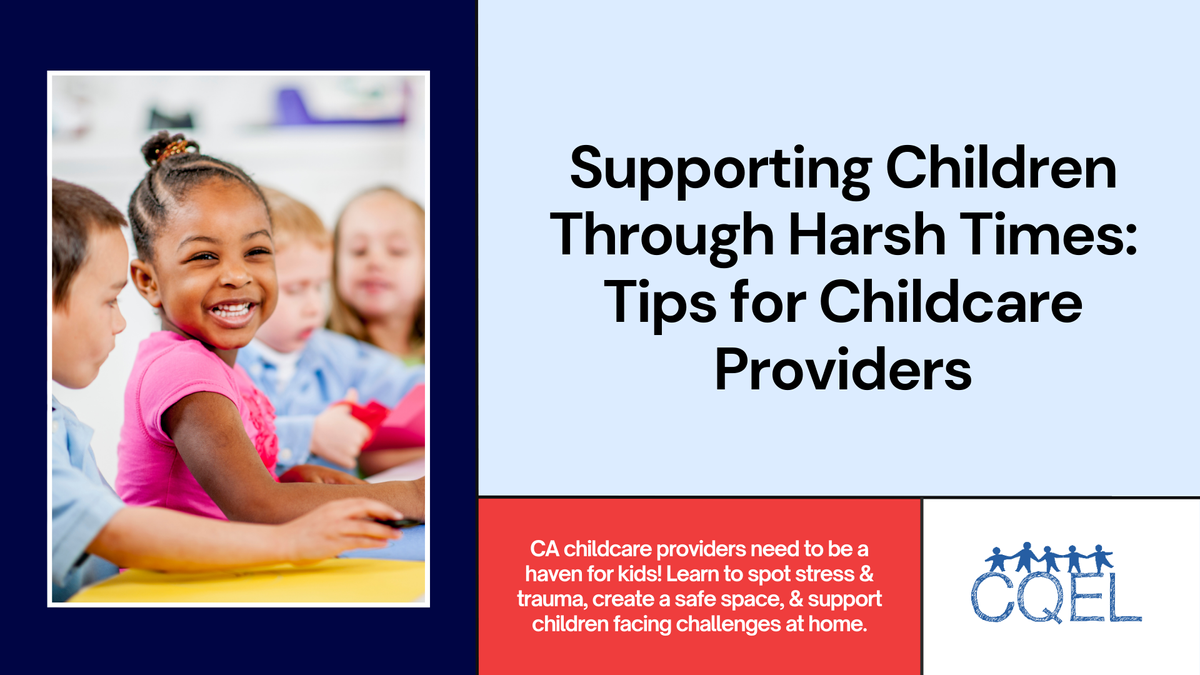Supporting Children Through Harsh Times: Tips for Childcare Providers
CA childcare providers: Be a haven for kids! Learn to spot stress & trauma, create a safe space, & support children facing challenges at home.

Childcare providers wear many hats. They're educators, nurturers, and sometimes, confidantes for the children entrusted to their care. The reach of a childcare provider's influence extends far beyond academics. They provide a safe space, a sense of routine, and a consistent source of support that can be especially crucial for children experiencing difficult situations at home. Whether it's a family experiencing a divorce, a loss in the family, or any other source of stress, childcare settings can offer a haven and a support system. Understanding the signs of stress and trauma in children, creating a safe and supportive environment, and implementing trauma-informed practices are essential tools for childcare providers in California.
Children experiencing stress or trauma may exhibit changes in their behavior. Withdrawal, becoming unusually clingy, or regressing in developmental milestones can all be signals that a child is struggling. Emotional indicators like frequent sadness, difficulty managing anger outbursts, or anxiety that interferes with daily activities are also important to recognize. Physical manifestations of stress and trauma in children should not be overlooked either. Changes in sleep patterns, appetite fluctuations, or frequent headaches and stomachaches can all be signs of underlying emotional distress.
Creating a safe and supportive environment is the cornerstone of effectively supporting children through harsh times. Building trusting relationships with each child is paramount. By being patient, empathetic, and showing genuine interest in their lives, childcare providers can create a space where children feel comfortable expressing their emotions and seeking guidance. Maintaining consistent routines and schedules provides a sense of predictability and security, especially for children facing uncertainty at home. Furthermore, using positive and validating language when communicating is essential. Actively listen to their concerns without judgment, and help them develop healthy ways to express their emotions.
Trauma-informed care is a valuable approach for childcare providers in California supporting children who have experienced difficult situations. Trauma is any experience that overwhelms a child's ability to cope, and it can have a lasting impact on their development and sense of security. Trauma-informed care involves understanding the potential effects of trauma and implementing strategies that promote healing and resilience. Building trust and rapport with each child is crucial, as is fostering a sense of safety and predictability within the childcare setting. Strategies like offering choices, promoting self-regulation skills, and providing opportunities for physical activity can all be beneficial.
The National Center for Trauma-Informed Child-Welfare Practice (NCTSN) offers a wealth of resources and training opportunities for childcare providers seeking to learn more about trauma-informed care (https://www.nctsn.org/). Collaboration with families and mental health professionals, when necessary, is also crucial for ensuring a holistic approach to supporting children experiencing difficult times.
California offers valuable resources to support childcare providers in their efforts to create nurturing environments for all children. The California Department of Education's Early Learning and Development Division provides information, professional development opportunities, and guidance on creating safe and supportive learning environments (https://www.cde.ca.gov/sp/cd/). First 5 California is another excellent resource, offering a wealth of information and training materials specifically focused on early childhood development, social-emotional learning, and supporting children who have experienced trauma (https://www.ccfc.ca.gov/). The California Association for the Education of Young Children (CAEYC) offers professional development opportunities and resources specifically focused on social-emotional development and supporting children facing challenging experiences (https://caeyc.org/).
By recognizing the signs of stress and trauma, creating a safe space, and implementing trauma-informed practices, childcare providers play a vital role in supporting children through difficult times. Their dedication and compassion can make a world of difference in a child's life, fostering resilience and ensuring they have the emotional security needed to learn, grow, and thrive.
